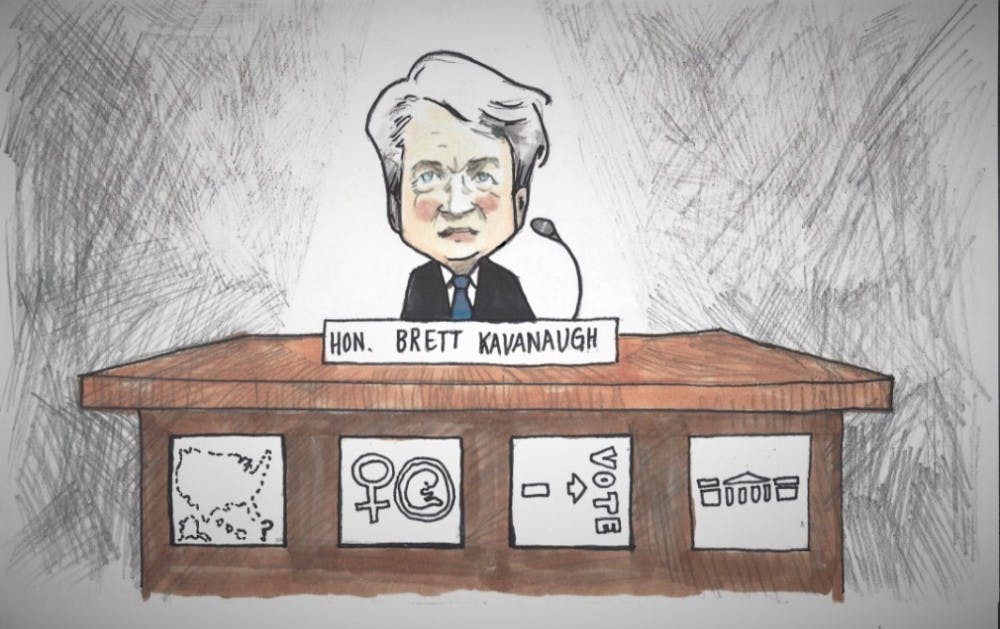The effort to confirm Brett Kavanaugh to the U.S. Supreme Court has erupted in controversy seemingly overnight. But beyond the allegations of sexual misconduct against Kavanaugh, his confirmation would have significant negative effects on the University community due to the circuit judge's stances on immigration as well as voting and reproductive rights.
His ideology can be understood through his past rulings.
Kavanaugh's decisions that have touched on immigration matters have not transpired favorably for the immigrant community.
Additionally, Kavanaugh's relationship with reproductive rights have not been promising as past opinions have discouraged the topic, specifically for young adults.
Finally, Kavanaugh has ruled in favor of stricter voting regulations that have resulted in legal counter action from the Justice Department.
In Garza v. Hargan, Kavanaugh ruled to prevent an undocumented individual from receiving an abortion despite complying with all legal requirements.
Andrea Nill Sanchez, from Latinos for a Fair Judiciary, said regarding the meaning of Kavanaugh’s ruling, “undocumented immigrants aren’t entitled to the same constitutional rights.”
The implications of the dissent is a direct red flag for the DACA community at ASU.
The confirmation of Kavanaugh onto the Supreme Court would uphold an ideology that is dangerous to ASU DACA students, and one that does not support equal distribution of the protections granted by the Constitution. Currently, ASU students on DACA are entitled to constitutional rights.
This dissent targets DACA recipients, and students as a whole that may require legal access to reproductive rights such as abortion and contraceptives.
Moreover, the Garza v. Hargan dissent from Kavanaugh revolved around a teenager. Kavanaugh did not feel that the teenager inquiring an abortion was capable of making the decision on their own. This makes young adults, such as college students, the clear target that Kavanaugh would not hesitate attacking when managing issues on reproductive rights.
After a panel at ASU to discuss Latinx students and Kavanaugh's nomination, Melissa Garcia, associate director for the Planned Parenthood Raiz Program said, "a quarter of our patients identify as Latino." Garcia stated that Planned Parenthood Arizona does not ask patients for documentation.
She discussed the current political attitude involving reproductive rights for students.
"This is a reality that we're living in and the big fear that we saw that students and Latinos across the nation, specifically here in Arizona, may face if the administration does nominate or move forward with the nominee," Garcia said.
If the Supreme Court does not deal with reproductive rights matters now, they are still at risk of being on the chopping block for decades to come.
Juan Cartagena, with LatinoJustice PRLDEF, spoke about the longevity of the impact of a supreme court justice.
"The longevity of the power given to a person to affect the rule of law is significant," Cartagena said. "Whether you agree or disagree with Trump, his job legacy will outlast regardless of how many years he serves."
Another issue that directly impacts a vast amount of ASU students is voting rights. In 2012, Kavanaugh voted in favor of a law that the Justice Department viewed as violating the Voting Rights Act. The controversial regulation would have mandated voters to show photo identification before attempting to cast a ballot. The regulation would not allow bills and other forms of identification to suffice.
Kavanaugh being on the Supreme Court could increase the already challenging voting system, especially for communities of color that have been the direct victims of the voting laws that Kavanaugh has supported.
Accessibility is already challenging, and students living on campus would be forced to face extra hurdles obtaining unnecessary documents in order to meet the requirements that Kavanaugh would want in order for them to vote.
This is especially important to highlight, as accessibility may not be equitable for students on college campuses. Cartagena highlighted one of the voting rights problems and urged students to evaluate "how students are treated by election boards."
Kavanaugh's time on the bench could be a direct threat to the voting rights of students.
The confirmation of Kavanaugh will increase hostility between students and the government, as college-aged students will begin to experience a new, more restricted norm.
Reach the columnist at jguzma19@asu.edu or follow @JennyGuzmanAZ on Twitter.
Editor’s note: The opinions presented in this column are the author’s and do not imply any endorsement from The State Press or its editors.
Want to join the conversation? Send an email to opiniondesk.statepress@gmail.com. Keep letters under 500 words and be sure to include your university affiliation. Anonymity will not be granted.
Like The State Press on Facebook and follow @statepress on Twitter.




